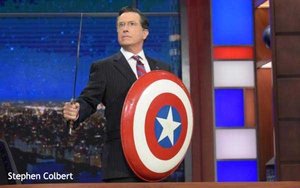
A bunch of Viacom lawyers won’t let Stephen Colbert just be himself.
But what is the self? And how can it be defined? That is the
question -- or questions plural. Another question: Since when does the TV Blog concern itself with such philosophical issues?
The answer: Since last
week, when Viacom served notice to the good people at “The Late Show with Stephen Colbert” that the fictional character known as “Stephen Colbert” from the old “Colbert
Report” on Comedy Central belongs to them.
As Colbert himself -- the real one -- revealed last week on his CBS show, Viacom lawyers wrote his show a
letter objecting to his portrayal recently on “The Late Show” of the bloviating, pompous character he used to play on Comedy Central. They either implied, or demanded outright, that he
cease playing “Stephen Colbert.” And if he doesn’t, they’ll sue (at least that was the implication, or the threat).
advertisement
advertisement
Colbert v.
“Colbert” is a court case I’d like to see. It calls into question the whole sphere of what we call acting. In this case, the central question seems to be: If an actor plays a
character who may or may not be different than the real person, and the character happens to have the same name as the actor playing him, who gets priority? Is it the company that claims ownership of
all intellectual property within a production it owns, including this character?
Or if this dispute were to actually be adjudicated in a court, would Stephen
Colbert have to demonstrate that the “Stephen Colbert” character is really so much like the real Colbert that the two are inseparable and indistinguishable, and in effect,
“really” him? In this context, the real Colbert would seem to be the real “owner” of “Stephen Colbert.” After all, Comedy Central can’t own a person, can
it?
If this sounds confusing, it’s because it is confusing. Which is why it’s such a great story. Rightfully, various TV columnists have pointed
out how NBC held tight to such “intellectual property” as “Larry Bud Melman” when David Letterman defected to CBS, and “the masturbating bear” from “Late
Night With Conan O’Brien” when O’Brien started his new late-night show on TBS.
Sure, this stuff is hilarious. It also bedeviled the
Letterman show for years, every time the producers of his CBS show sought to do any anniversary retrospectives and NBC said no to their requests for video clips from his years at NBC. (They seemed to
have finally relented for the elaborate clip sequence seen on Letterman’s final “Late Show” on CBS in May 2015.)
But beyond the
intellectual property wars in late-night TV, Viacom’s “Colbert” threat reminds me of other lawsuits I’ve covered, such as a CBS suit brought against Fox in 2001 in which CBS
objected to the Fox competition-reality show called “Boot Camp” because CBS felt it was too similar to “Survivor.”
I remember writing
back then that the two shows were similar in at least one area: Contestants on both shows had a similar preoccupation with bodily functions such as going to the bathroom -- which made both shows
disgusting to watch.
In another suit from 2003, Spike Lee sued Viacom (which didn’t like being sued) over the company’s use of the name
“Spike” for a new cable network it was planning to launch in place of The Nashville Network, which Viacom was folding. This suit was serious enough to earn a temporary injunction from a
New York court that delayed the launch of the Spike network for several months.
In the end, Spike Lee couldn’t get Viacom to drop the name Spike from
its cable network. Today, both Spike Lee and Spike the network are alive and well and apparently thriving. To my knowledge, no one is confusing one with the other.
Perhaps there is a lesson here for the Viacom lawyers who won’t let Stephen Colbert be “Stephen Colbert.” And if any readers of this blog know what that lesson is, please
let me know, because I have no idea. This is much too confusing for me.